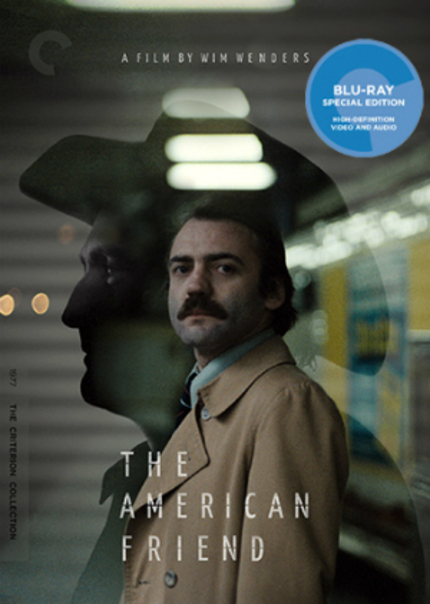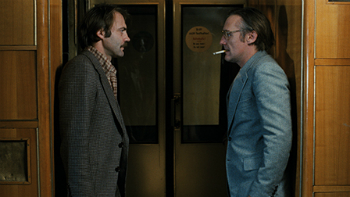Now On Blu-ray: Wim Wenders' THE AMERICAN FRIEND On Criterion

It's startling to me that The American Friend, a pitch-black film noir, remains so fresh and vibrant.
Originally released in 1977, the film was part of a wave of "New German Cinema" that swept beyond the country's borders to international acclaim and opened the way for director Wim Wenders to come to America to make movies. It was a mixed blessing at best, as Wenders wryly acknowledges in a new interview for the Criterion Collection's beautiful new Blu-ray edition, available tomorrow (Tuesday, January 12).
Drawn from Patricia Highsmith's Ripley's Game, the film stars Dennis Hopper as Ripley, an amoral character first portrayed by Alain Delon in René Clément's Purple Noon. He shows up in Hamburg, Germany, to sell a painting by a supposedly dead artist, and has a fateful encounter with Jonathan Zimmerman, a framer who supposedly has a fatal disease. Slowly the two become entwined in an unhealthy relationship that leads to murder.
After missing innumerable opportunities, I finally caught up with the film in June 2011 and was utterly entranced by it. I wrote in part:
The American Friend is spare and minimal. Bruno Ganz is painfully, quietly eloquent as Jonathan, a good man drawn into evil out of a love for his wife and young son. Dennis Hopper, having recently completed his adventure with Coppola in Apocalypse Now, gives one of his trademark performances as Tom Ripley (quite an achievement in view of his admitted indulgences at the time). Robby Müller does amazing things with the muted yet somehow vibrantly colorful photography. Jürgen Knieper's musical score is vaguely reminiscent of Bernard Herrmann while establishing its own haunting refrains.This is a movie that doesn't knock you over the head with its brilliance. It plays against type, eroding the trappings of the mystery movie genre until all that's left is the emotional residue of one person destroyed by another.
Watching the movie twice more has only confirmed my feelings about The American Friend. It's a sinuous, sinister piece of cinema.
The Disc:
 The transfer on the Criterion Collection Blu-ray is an improvement over the Anchor Bay DVD released in 2003, which enhances the viewing experience. Robby Müller, who served as director of photography, is a master of lighting, and that becomes even more apparent because there is motion in virtually every shot.
The transfer on the Criterion Collection Blu-ray is an improvement over the Anchor Bay DVD released in 2003, which enhances the viewing experience. Robby Müller, who served as director of photography, is a master of lighting, and that becomes even more apparent because there is motion in virtually every shot.
It's easy to become enveloped in the atmosphere, even as the narrative shifts quickly from Hamburg to Paris to Hamburg to Munich and back again. It's mostly shot from the perspective of Zimmerman, and so the consistency of his point of view becomes a major story point, because his character goes through a sea change, from a man who has accepted his lot in life to one who becomes unmoored from everything he held dear.
The original mono audio track is now presented in 5.1 surround DTS Master Audio. Jürgen Knieper's original music, complete with nods to Bernard Herrmann, sounds splendid.
The audio commentary with Wim Wenders and Dennis Hopper was originally recorded in 2002 for the Anchor Bay DVD release. I noted previously: "Hopper disappears from time to time -- was he stepping out for a smoke? -- but Wenders keeps up a steady stream of interesting anecdotes about the production, locations, actors, and Hopper.
"Wenders takes care to point out all the directors who appear as villains; he explains that he doesn't feel he understands how to effectively portray bad guys on screen, so once he'd secured Hopper to play Ripley, it only made sense to cast directors to help him flesh out the evil characters. Thus, the appearances of Sam Fuller, Nicholas Ray, Gérard Blain, Peter Lilienthal, Daniel Schmid, and Jean Eustache in the cast."
Several other supplements are included.
A Tale of Two Minds: Wim Wenders on THE AMERICAN FRIEND, recorded in September 2015, features Wenders in a solo, 37-minute discussion of the film. He repeats some of the same anecdotes covered in the audio commentary but at greater length. For example, he details his visit to see Patricia Highsmith and also elaborates on the differences that arose early between Hopper and Ganz. With Hopper having passed in the interim, Wenders now clarifies that the actor was suffering from the effects of his various addictions but remains firmly convinced that he gave a brilliant performance that served as a turning point.
Framing Jonathan: Bruno Ganz on THE AMERICAN FRIEND, also recorded in September 2015, features the actor in a solo 27-minute discussion. Ganz provides the background of his career before making the movie, and explains why he feels it was his true debut, even though he'd made several films already. He gives his viewpoint on the clash he experienced with Hopper during early days of filming.
Ganz is also extraordinarily modest about his marvelous performance, feeling that he was hampered due to his inexperience, and also in comparison to Hopper's masterful work. As an experienced stage actor, he both admired and was intimidated by Hopper's improvisational abilities, and wishes that he was more capable of coming close to Hopper's level.
More than 20 minutes of deleted scenes are included, with audio commentary by Wenders, as well as the original theatrical trailer. A booklet features an essay by author Francine Prose.
This is an excellent film that has held up well. The Criterion Collection's Blu-ray is a top-notch presentation of an important work that is also a great entry point for exploring the Wim Wenders ouevre.







